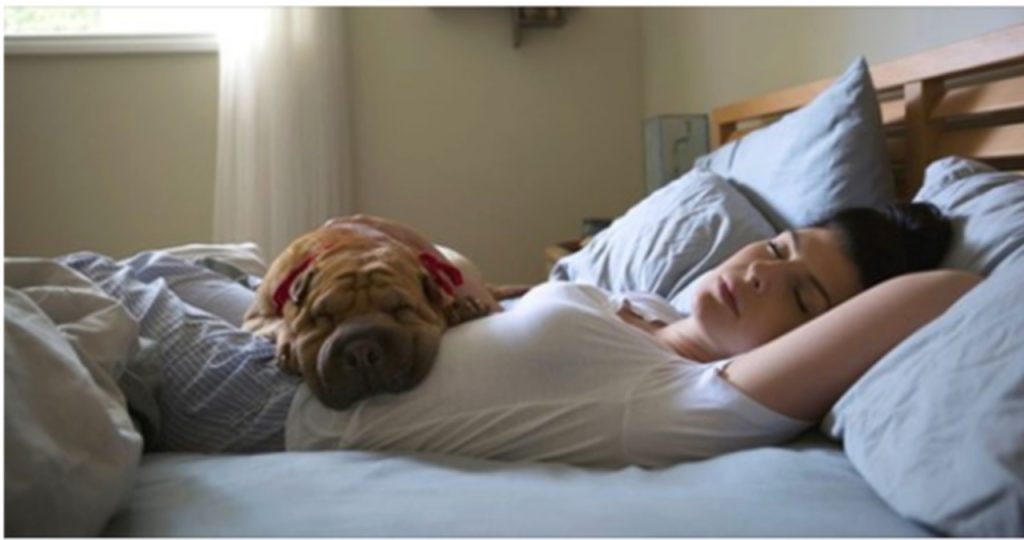
It’s obvious that getting enough sleep is super important for our health. That’s why a lot of scientists are looking into how to improve our sleep quality. But instead of drinking chamomile tea or doing meditation before hitting the hay, new research shows that women actually sleep better when they have dogs by their side. Yup, a study from Canisius College in New York found that dogs are better sleep buddies than people or cats.
According to Christy Hoffman, Ph.D., who studies animal behavior and led the research, women often think that dogs make better sleeping buddies than cats or even other people. They also say that having a dog helps them sleep better.
Research Finds that Women Sleep Better Next to Dogs
Hoffman conducted a survey involving nearly one thousand women residing in the United States to reach these conclusions. The findings indicated that 55% of the respondents slept in the same bed as at least one dog, while 31% did so with at least one cat. Additionally, 57% of these women shared their bed with a human partner, whereas the remaining participants did not.
Hoffman also identified the reasons why dogs are often considered the most suitable companions for sleeping. The primary reason is that the sleeping patterns of dogs, in contrast to those of cats, bear a closer resemblance to those of humans.
“The difference between dogs and cats is not surprising because dogs’ major sleep periods tend to coincide more closely with humans’ than do cats,’” said Hoffman.
Nevertheless, despite the potential advantages of these comparable sleep patterns, further investigation is required to confirm their efficacy. Nonetheless, Hoffman has proposed some theories on how this concept could be implemented.
She stated, “When compared to human bed partners, dogs might be more adept at aligning with their owner’s sleep patterns. It is quite common for human partners to have significantly different bedtimes and wake-up times. These discrepancies in schedules can undoubtedly interfere with sleep. It appears that canine companions are more likely to adjust to their owner’s routines than human partners.”
Additionally, dogs necessitate specific schedules and duties, including a morning walk. This structured routine aids their owners in establishing a consistent daily pattern, which in turn enhances the quality of their sleep.
Stillness and Security
Furthermore, dogs have a tendency to remain immobile while sleeping. Those who have shared a bed with a restless partner understand the disturbance they can cause. Nevertheless, the female participants in the research indicated that their dogs stayed on the bed for the majority of the night, unlike cats, which tended to move in and out.
Hoffman stated that cats are more prone to causing disruptions by moving on and off the bed during the night compared to dogs. Moreover, the study revealed that dog owners adhere to more consistent bedtime and wake time routines than cat owners, and they also have a tendency to go to bed earlier and wake up earlier than cat owners.
The third and most significant reason is that dogs offer their owners a profound sense of security, surpassing the comfort provided by cats or even human companions.
Hoffman stated that certain dog owners find solace in the belief that their dog will warn them in the event of an intruder or emergency; additionally, a dog’s bark could discourage a potential intruder. A cat is less inclined to fulfill this duty, therefore, may not offer the same level of psychological reassurance as a dog.
The Best Partner for Quality Sleep
The research indicates that dogs can be great sleeping companions, but the advantages may vary depending on the individual situation. Some dogs may snore or make the bed too warm. On the other hand, some owners discover that their cats are actually more helpful for their sleep.
It is important to consider that the study focused on the volunteers’ perceptions of how their pets impact their sleep quality and duration. Therefore, further research is necessary to conclusively determine if dogs are indeed the best sleeping companions. Nonetheless, Hoffman suggests that these findings could be valuable given the prevalence of pets in American homes.
The continuation of this research will prove to be beneficial in gaining a deeper understanding of the circumstances in which having pets in bed can enhance sleep quality, as well as identifying situations where sharing a bed with a pet may have negative effects on one’s sleep quality,” she stated.
For example, studies have indicated that women experience improved sleep quality when sleeping alone as opposed to with a partner, despite common beliefs suggesting otherwise. It is suggested that future research may benefit from utilizing wearable technology similar to Fitbit devices to accurately monitor and assess the sleep patterns of individuals under various sleeping conditions.



